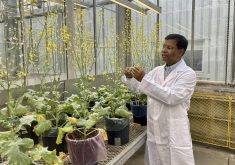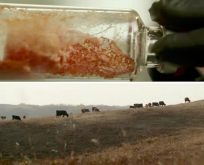You might need to cook your meat at a higher temperature next time you fire up the barbecue.
Scientists from the University of Alberta have found a new heat-resistant E. coli that can survive at 71 C — the level of heat advised by Health Canada for proper cooking.
“We discovered that some strains of E. coli have genetics in them that make them heat resistant when they are in wet meat,” said Lynn McMullen, a meat microbiologist and professor of food microbiology, who discovered the new strains with colleague Michael Ganzle.
Read Also

Farming Smarter receives financial boost from Alberta government for potato research
Farming Smarter near Lethbridge got a boost to its research equipment, thanks to the Alberta government’s increase in funding for research associations.
Most strains of E. coli die when heated to around 60 C in a broth, but the new strains can survive for up to 70 minutes.
“Typically, if you cook a burger to 71 C, you get very good kill,” said McMullen. “But with this strain, we didn’t. Fortunately the strain we found is not a pathogen.”
There are two types of E. coli bacteria; pathogenic and non-pathogenic. The pathogenic type can make people sick, while the non-pathogenic type are responsible for spoiling meat. Symptoms of the sickness include nausea, cramping, vomiting and bloody diarrhea. Ingesting E. coli can lead to death, especially in vulnerable populations.
The discovery means Health Canada may need to change its recommended cooking temperatures for meat.
McMullen and Ganzle, who have been working on the pro-ject for eight years, know there are heat-resistant strains similar to 0157, the strain that makes people sick. About two per cent of all E. coli in publicly available databases have the gene for heat resistance. The discovery of the new heat-resistant strains of E. coli could explain why there continue to be sporadic E. coli cases.
McMullen’s team will continue conducting experiments to determine how to kill heat-resistant strains of E. coli.
“We have tons of work to do. Our next step is to figure out what we need to do to control these organisms,” she said.
E. coli can be found in all types of meat, and adding salt to the meat makes the situation much worse. The researchers don’t know how common the new heat-resistant strains are.
“We need to find out what’s out there and this is difficult because the processors don’t want us going into their processing plants looking for E. coli and other pathogens,” she said.
The researchers will get around this by accessing other culture collections and collecting different strains from researchers in Canada and the United States.
But for now?
“Our best advice is for people to use a thermometer when they are cooking and make sure that things get over 71 C,” she said.
















